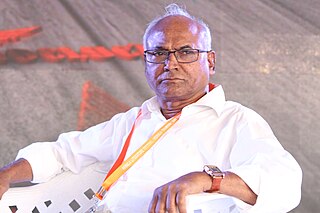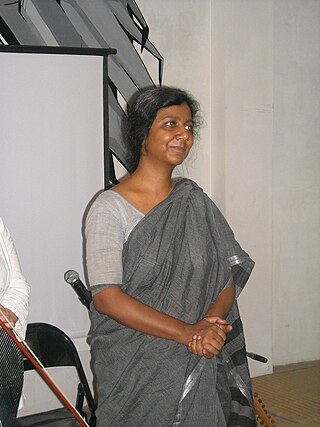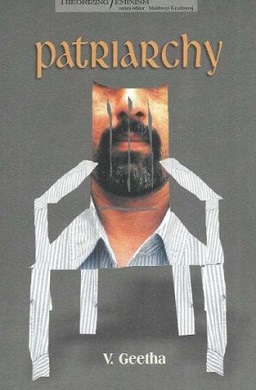Marathi literature is the body of literature of Marathi, an Indo-Aryan language spoken mainly in the Indian state of Maharashtra and written in the Devanagari and Modi script.

Mahasweta Devi was an Indian writer in Bengali and an activist. Her notable literary works include Hajar Churashir Maa, Rudali, and Aranyer Adhikar. She was a leftist who worked for the rights and empowerment of the tribal people of West Bengal, Bihar, Madhya Pradesh and Chhattisgarh states of India. She was honoured with various literary awards such as the Sahitya Akademi Award, Jnanpith Award and Ramon Magsaysay Award along with India's civilian awards Padma Shri and Padma Vibhushan.

Kancha Ilaiah Shepherd is an Indian political theorist, writer and a Dalit rights activist. He writes in both English and Telugu languages. His main domain of study and activism is the annihilation of caste.
Tarabai Shinde (1850–1910) was a feminist activist who protested patriarchy and caste in 19th century India. She is known for her published work, Stri Purush Tulana, originally published in Marathi in 1882. The pamphlet is a critique of caste and patriarchy, and is often considered the first modern Indian feminist text. It was very controversial for its time in challenging the Hindu religious scriptures themselves as a source of women's oppression, a view that continues to be controversial and debated today. She was a member of Satyashodhak Samaj.

Moushumi Bhowmik is an Indian singer-songwriter, writer and researcher based in Kolkata, she is known to perform Bengali folk songs, as well as her own compositions. She has released four albums― Tumio Chil Hao (1994), Ekhono Galpo Lekho (2000), Ami Ghor Bahir Kori (2001), Songs from 26H (2017). She has composed for documentaries and art cinema. Bhowmik created The Travelling Archive, based on field recordings from Bengal. Moushumi Bhowmik submitted her PhD dissertation on 'Songs of Absence and Presence: Listening to the Arnold Bake Wax Cylinders from Bengal: Listening to the Arnold Bake Wax Cylinders from Bengal 1931-34' at Jadavpur University.

Nabaneeta Dev Sen was an Indian writer and academic. After studying arts and comparative literature, she moved to the USA where she studied further. She returned to India and taught at several universities and institutes as well as serving in various positions in literary institutes. She published more than 80 books in Bengali: poetry, novels, short stories, plays, literary criticism, personal essays, travelogues, humour writing, translations and children's literature. She was awarded the Padma Shri in 2000 and the Sahitya Akademi Award in 1999.
Manikuntala Sen was one of the first women to be active in the Communist Party of India. She is best known for her Bengali-language memoir Shediner Kotha, in which she describes her experiences as a woman activist during some of the most turbulent times in India's history.
Sulekha Sanyal was a Bengali writer and activist. She emerged as an early feminist in the region through her work Nabankur in 1956. The work has been translated to English in 2001 by Gouranga P. Chattopadhyay.

Orient Blackswan Pvt. Ltd., is an Indian publishing house headquartered in Hyderabad, Telangana.
Kali for Women was a start-up feminist publisher in India. Urvashi Butalia and Ritu Menon set up Kali for Women in 1984, arguably the first Indian publishing house dedicated to publishing on and for women. When they decided to take this step, Butalia had worked with Oxford University Press and Zed Books in Delhi, while Ritu Menon was a scholar. They started with very little capital but with an urgent sense that they had to make Indian women's voices heard, through academic publishing and activist works, translation and fiction. They were followed by other Indian presses concerned with gender and social issues, such as Bhatkal and Sen who publish the imprints Stree and Samya and Tulika Books.

Ilavenil Meena Kandasamy is an Indian poet, fiction writer, translator and activist from Chennai, Tamil Nadu, India.
Dalit literature is literature written by Dalits about their lives. Dalit literature emerged in the 1960s in the Marathi language, and it soon appeared in Bangla, Hindi, Kannada, Punjabi, sindhi, and Tamil languages, through narratives such as poems, short stories, and autobiographies, which stood out due to their stark portrayal of reality and the Dalit political scene.

Popular Prakashan is an Indian independent publisher and bookseller founded in Bombay in 1924.
Bama , also known as Bama Faustina Soosairaj, is a Tamil Dalit feminist, teacher and novelist. Her autobiographical novel Karukku (1992) chronicles the joys and sorrows experienced by Dalit Christian women in Tamil Nadu. She subsequently wrote two more novels, Sangati (1994) and Vanmam (2002) along with three collections of short stories: Kusumbukkaran (1996) and Oru Tattvum Erumaiyum (2003), 'Kandattam'(2009). In addition to this, she has written twenty short stories.
Rassundari Devi was a Bengali woman who is identified as the author of first full-fledged autobiography in modern Bengali literature. She is among the earliest woman writers in Bengali literature.
Susie Tharu is an Indian writer, publisher, professor, editor and women's activist. Throughout her career and the founding of several women's activist organizations, Tharu has helped to highlight those issues in India.
Dalit studies is a new field of research in India which looks at the problem of marginalised groups, namely Dalits, tribals, religious minorities, women from excluded groups, denotified tribes, physically challenged and similar groups in economic, social and political spheres. Dalit studies scholars also undertake research on the nature and forms of discrimination and social exclusion faced by marginalised groups.
P.Sivakami is an Indian Dalit-Feminist writer, former IAS officer and activist predominantly writing in Tamil. Her notable works include Pazhayana Kazhidalum, Kurruku Vettu, Nalum Thodarum and Kadaisi Mandhar. Apart from being one of the most prominent Dalit novelists in India, she has also constantly voiced her opinions on contemporary social and political issues. An author of six novels and more than 60 short stories. P. Sivakami has regularly kept in touch with editing and has actively contributed to the monthly magazine Puthiya Kodangi since 1995. She is a significant presence on social media through her Twitter account.

D. Ravikumar is an Indian Tamil intellectual, writer, lawyer politician and an anti-caste activist. He was the editor of the magazine, Nirapirikai. Nirapirikai inspired several new writers in the 1990s in Tamil Nadu. He is an Ambedkarite. Ravikumar is the current Member of Parliament in the Lok Sabha from Viluppuram and member of the Dravida Munnetra Kazhagam.

Patriarchy is a 2007 book by V. Geetha, an academic activist and author on the subject of patriarchy in India. The book, written from the female perspective, is part of the "Theorizing Feminism" series published by Stree and first book on patriarchy in 1680 was written by sir Robert filmer. Three editions have been published.








